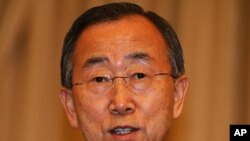U.N. Secretary-General Ban ki-Moon in Thailand to assess the country’s flood crisis says the global community needs to back funding for climate-change mitigation to follow up the promises made during the 2009 Copenhagen climate conference. Ban's call comes three weeks before a climate-change conference in Durban, South Africa.
The secretary-general, speaking to journalists Wednesday, renewed a plea to the global community to assist in meeting the financial costs of climate change on economies especially among developing nations.
A leaders’ meeting is set for Durban, South Africa on November 28 with Ban pressing for political leadership and commitment as well as the mobilizing of funds promised by states at the global climate conference in Copenhagen in 2009.
“I again urge the member states to make clear guidelines and deliver that had been pledged in Copenhagen in 2009, and that is $30 billion by the end of 2012 next year for developing countries to adapt and mitigate,” he said.
At the Copenhagen meeting, leaders pledged up to $100 billion annually by 2020 to assist developing countries vulnerable to the impact of climate change. Ban called for states to show political will in meeting the financial challenges. The Durban meeting hopes to press ahead with implementation of the United Nations Framework Convention on Climate Change and the Kyoto Protocol, as well as the Bali Action Plan.
“Mobilizing $100 billion maybe a big challenge, but it is doable if there is political will even at a time of economic crisis I believe we can do it," Ban said. "Therefore I am urging the world leaders to address this matter with a sense of urgency. We do not have any time to waste and I count on the leadership of world leaders, including Thailand.”
For more than two months, Thailand has grappled with the most severe flooding in 50 years. Two thirds of the country faced floods.
The Thai capital, Bangkok, remains under threat from millions of cubic meters of flood waters so far held at bay from the city’s prime financial and commercial heartland.
The floods have claimed over 560 lives with the central bank saying millions of homes remain inundated in northern Bangkok and surrounding provinces. Seven major industrial estates were flooded in Ayutthaya province. Up to one million jobs remain under threat with billions of dollars in economic and infrastructure damage.
Thai Prime Minister Yingluck Shinawatra says the government is looking long term to rebuild and rehabilitate, in light of climate change.
“We take this opportunity to capture [on to] the trend of the climate change," she said. "So we will build on this and redesign the whole water management system. We put to committees to make sure that in the longer term we will build better and we will rebuild better in the long term in the future.”
The cost of Thailand’s clean up from the flood is believed to be as high as $6 billion. Major investors, such as Japan’s Nissan Motor Company, are calling for long term flood prevention measures. The government announced this week a $300 million program for flood relief for recovery in the industrial sector.
UN Chief Calls for Support on Climate-Change Mitigation
- By Ron Corben




